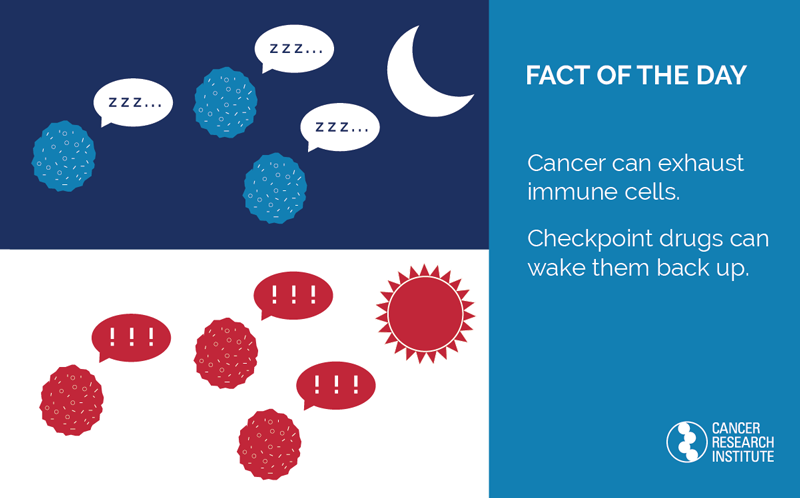
Cancer can exhaust immune cells. Checkpoint immunotherapies can wake them back up.
While the immune system naturally has the ability to eradicate tumors, in some circumstances they can instead be prevented from doing so. Immune checkpoint pathways are one of the mechanisms that can suppress and/or “exhaust” anti-cancer immune cells, which makes them tolerant of cancer. To address that, scientists have developed checkpoint inhibitor immunotherapies that block the activity of those pathways, re-energizing these immune cells and restoring their cancer-fighting abilities. These work especially well against heavily mutated tumors that the immune system has already recognized and mounted an initial response against.
CRI Scientific Advisory Council Director James P. Allison, Ph.D., was the first to identify an immune checkpoint pathway, the CTLA-4 receptor. His discovery then led to the development of ipilimumab, an anti-CTLA-4 checkpoint immunotherapy, which was first approved by the FDA in 2011 for melanoma. Since then, several other checkpoint pathways—most notably the PD-1/PD-L1 pathway—have been identified and immunotherapies have been developed to target them. Currently there are six FDA-approved checkpoint immunotherapies. Two of them, ipilimumab and nivolumab (an anti-PD-1 checkpoint immunotherapy) are approved in combination for the treatment of melanoma, while pembrolizumab (anti-PD-1) is approved as a first-line option for patients with advanced lung cancer and atezolizumab (anti-PD-L1) is approved as a first-line option for patients with advanced bladder cancer who are ineligible for chemotherapy.
The following CRI-funded scientists are exploring how to improve the effectiveness of current checkpoint immunotherapies as well as identifying and evaluating the therapeutic potential of new checkpoints:
- Mohamed Abdel Hakeem, Ph.D.
- Sadeem Ahmad, Ph.D.
- Scott J. Antonia, M.D., Ph.D., Georgina V. Long, M.D., Ph.D., Richard A. Scolyer, M.D., Mark John Smyth, Ph.D., FAHMS, and John Stagg, Ph.D.
- Matteo Bellone, M.D.
- Nina Bhardwaj, M.D., Ph.D., and Sacha Gnjatic, Ph.D.
- Adam N. R. Cartwright, Ph.D.
- Michael A. Curran, Ph.D.
- Rony Dahan, Ph.D.
- Susan M. Kaech, Ph.D.
- Amy K. Kim, M.D.
- John M. Kirkwood, M.D., and Hassane M. Zarour, M.D.
- Stephen Mok, Ph.D.
- Drew M. Pardoll, M.D., Ph.D., Antoni Ribas, M.D., Ph.D., and Cassian Yee, M.D.
- David M. Owens, Ph.D.
- Christophe Pedros, Ph.D.
- Stephen P. Schoenberger, Ph.D.
- Chong Sun, Ph.D.
- Haidong Tang, Ph.D.
- Ryan M. Teague, Ph.D.
- Derek Alan Wainwright, Ph.D.
- Lei Zheng, M.D., Ph.D.
Image credit: Cancer Research Institute